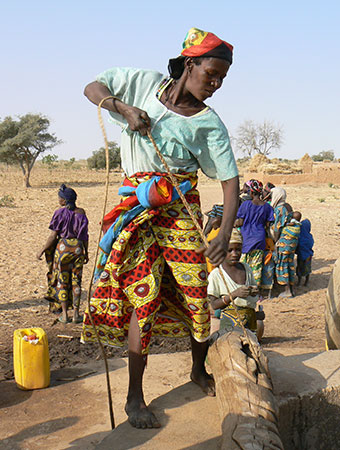by Sophie Glander
As of 2:30pm today, February 1, 2012, there are approximately 914,079,179 malnourished people in the world today. And today, it would cost about $21,567,000 to feed them all. But, instead, the USA and Europe spent that money, plus another $7 million, on food for their precious felines and canine (1). Yes, we all love our pets, but I think that the life of a child is slightly more important. World hunger is an immense issue to tackle, made more complicated by reoccurring droughts, high food prices, and disputes over land and water resources. However, the cause is not entirely hopeless.
Small farming in developing nations is one of the promising areas that should be focused on in order to reduce world hunger. Many of the West African Economies are agriculturally based, but due to limited and irregular rainfall, two harvests per five–year period are unsuccessful. The solution to this problem is an inexpensive, manageable irrigation system, which will allow farmers to survive the unpredictable droughts, therefore increasing food production and income while lowering poverty. Such technology, known as micro irrigation, is now a reality in West Africa, thanks to the efforts of the International Crop Research Institute for Semi–Arid Tropics (ICRISAT) and the World Vegetable Center (AVRDC). These African market gardens, as they are called, are drip systems that supply the plants’ roots with the minimum amount of water they need, reducing water usage by 80% and lowering the amount of weeds, which in turn cuts down on fertilizer and labor. The gardens use solar water pumps that are more expensive to purchase than diesel pumps, but in the end are cheaper to use and maintain.
In Niger, 120 women were given a plot of dry dirt and the supplies to set up some market gardens. Soon, they were able to transform the useless land into a sustainable farm that provided them and their families with healthy food and handsome profits. The system is easy for women to learn and operate, and gives them a sense of independence and pride. Yet again, it is the women who are the forces of real change in the community (2).
Wells Bring Hope recognizes the importance of educating people on farming techniques,particularly drip farming, when a village is provided with a safe water well. As part of what we do for every village, we teach people about how to use the grey water so that maximum use of a precious resource is achieved. Women are provided with seeds for growing vegetables which they then sell in the local market and give to their families to improve their diet. It is a critical part of improving quality of life in a village.
1. http://www.stopthehunger.com/
2. http://www.trust.org/alertnet/blogs/climate-conversations/micro-irrigation-
with-bollywood-backup-points-to-new-way-to-beat-hunger



